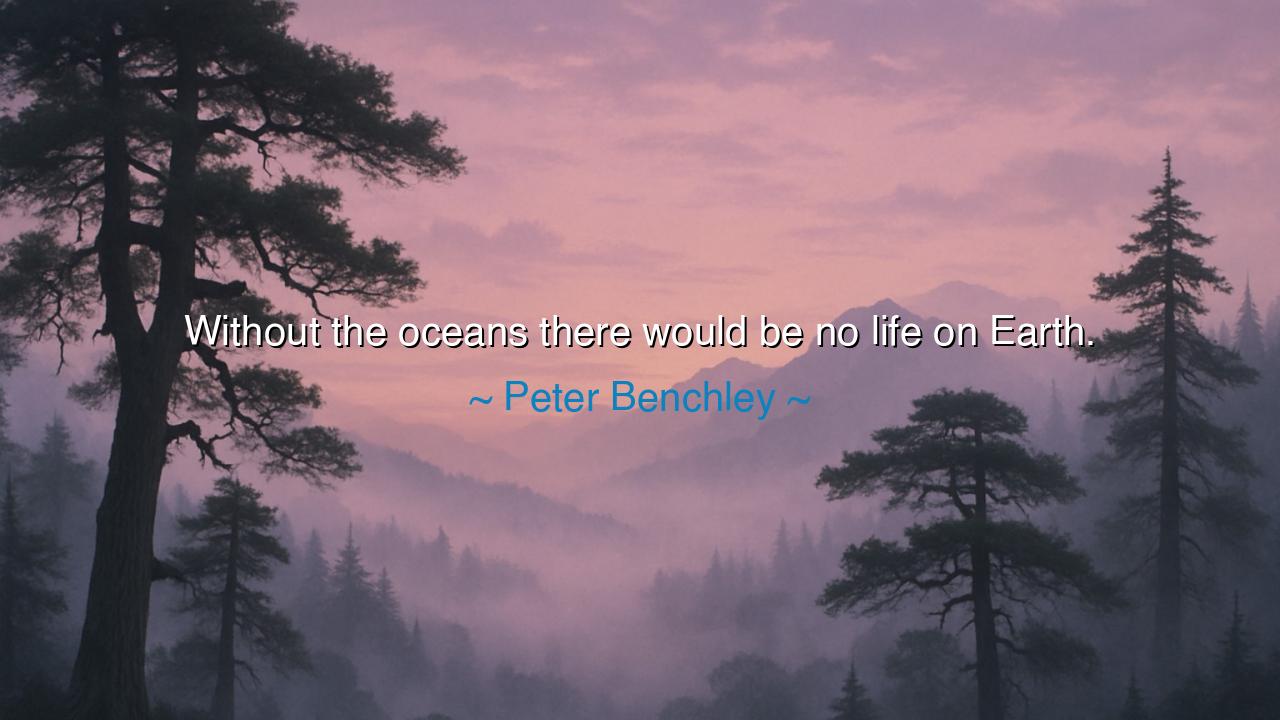
Without the oceans there would be no life on Earth.






Hear the sea’s verdict set upon the world like a seal of blue wax: “Without the oceans there would be no life on Earth.” In this sentence, Peter Benchley—storyteller of sharks and, later, penitent guardian of their realm—speaks a truth older than maps. The oceans are not a border that hems our continents; they are the cradle and the bloodstream of the planet. From their dark wombs first rose the spark of living chemistry; from their sunlit skin still rises the breath we draw. To forget this is to forget our own ancestry, to mistake the bowl for the meal and the roof for the sky.
Consider the first mornings of the world. In the warm fractures of seafloor vents, minerals murmured to molecules until patience became pattern and pattern became pulse. What we call life on Earth began as a hymn sung to salt and pressure. Even now, the choir continues: drifting phytoplankton cast nets of light and turn sunlight into food, stitching the first threads of every marine and many terrestrial chains. With their labor, they exhale oxygen—a vast, quiet tithe that seasons the air for forests, cities, and sleeping children. Thus the deep is not elsewhere; it is within our lungs.
The oceans are also the planet’s great engine of climate and time. Their currents move like the slow thoughts of Earth, carrying heat from equator to pole, smoothing the tantrums of weather into the long grammar of seasons. They drink carbon from our fevered breath and hide it in cold vaults, buying us hours we have not deserved. Their tides knead the shores, teaching coastlines humility and feeding estuaries with silt and life. Break this engine—heat it, choke it, strip it—and the calendar itself forgets how to turn its pages.
Let history offer a lantern. In 1998 and again in 2016, a great bleaching struck the Great Barrier Reef—corals paling like bones under a sudden sun. Fisherfolk counted fewer catches; guides watched guests weep through masks; scientists marked the mortality like undertakers who loved their clients. Yet where currents cooled and stress eased, some reefs breathed back—proof that the sea, though wounded, remembers how to heal when given time and tenderness. This is not myth; it is instruction: relieve the oceans, and they will lift us in return.
Benchley’s words carry the weight of repentance. Having once stoked fear of the fin, he later spent his voice pleading for sharks and the webs they hold in balance. Here is a second origin of the quote: not only in geology, but in conscience. He saw that demonizing the predator invites the ruin of the prey; that vilifying the wave invites the ruin of the shore. To say “Without the oceans there would be no life” is also to say: “Honor what keeps you.” A sailor nails this into the mast; a city must carve it into its laws.
Let the lesson be hewn plain as a keel: our welfare is a function of water kept living. Protect the nursery mangroves and the seagrass meadows; spare the spawning grounds and the migratory roads of whales; keep plastic out of bellies and noise out of ears; give coasts room to breathe and rivers the courtesy of clean arrivals. Every mercy to the oceans multiplies—into safer storms, fuller nets, calmer summers, and an inheritance our descendants can thank rather than forgive.
And now, the sailor’s checklist for landlocked hearts: (1) Cut what burns—choose clean power and efficient habits so the sea need not swallow so much heat and carbon. (2) Eat with a tide table—favor sustainable seafood, shun the plundered species, and learn the names behind the labels. (3) Refuse single-use—bottle, bag, and glitter that becomes a mouthful for turtles and birds; carry durable things and mend them. (4) Defend blue sanctuaries—support marine protected areas large enough to function and long enough to matter. (5) Heal the watershed—plant where rain falls, fix where runoff fouls; every stream is a fuse that leads to the sea. (6) Lift your voice—for policies that price pollution, for research ships and coastal buffers, for quiet in shipping lanes where giants listen. Do these steadily, and Benchley’s oracle will remain a benediction rather than a eulogy: the oceans alive, and with them, all life on Earth.






AAdministratorAdministrator
Welcome, honored guests. Please leave a comment, we will respond soon